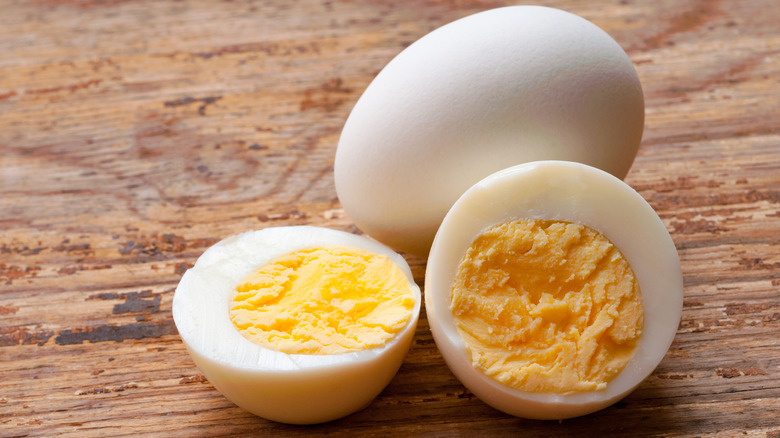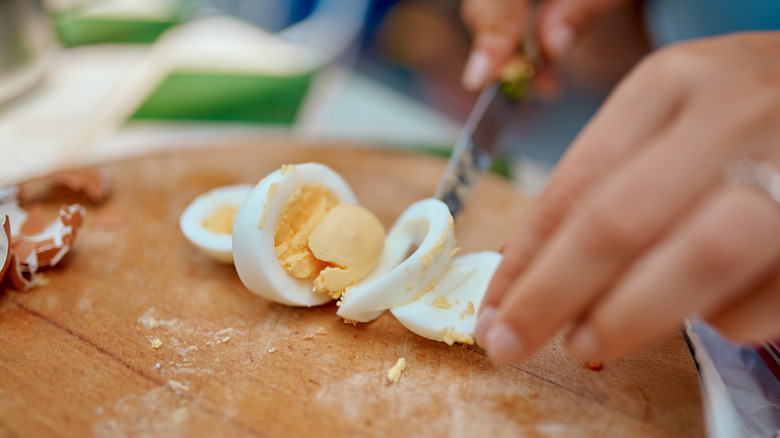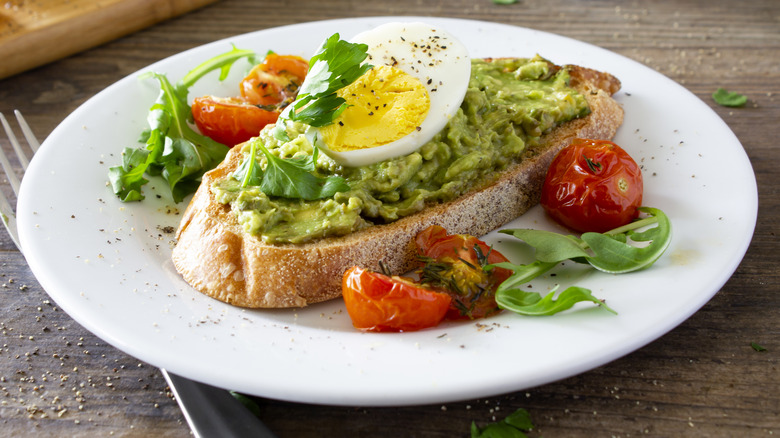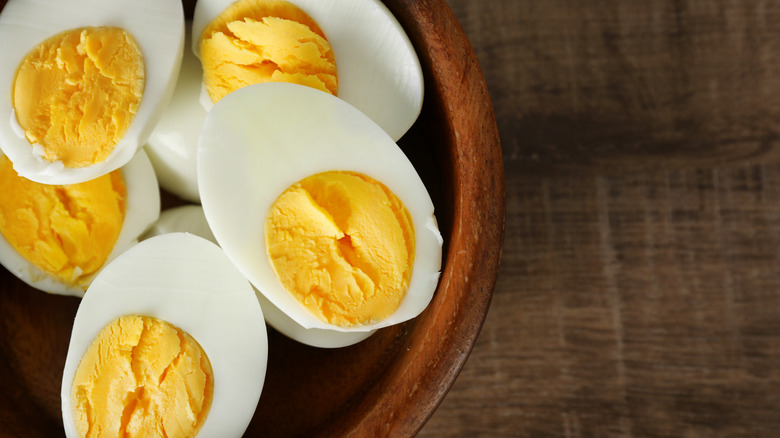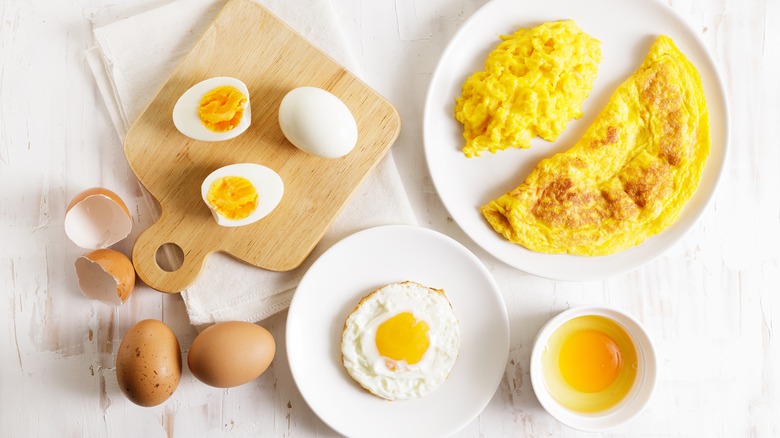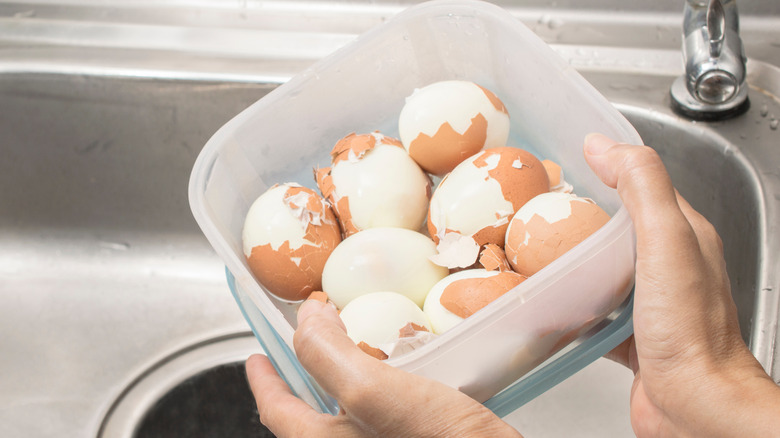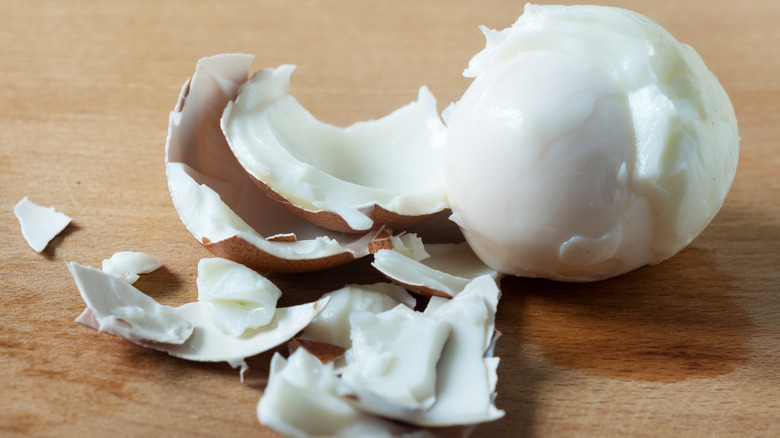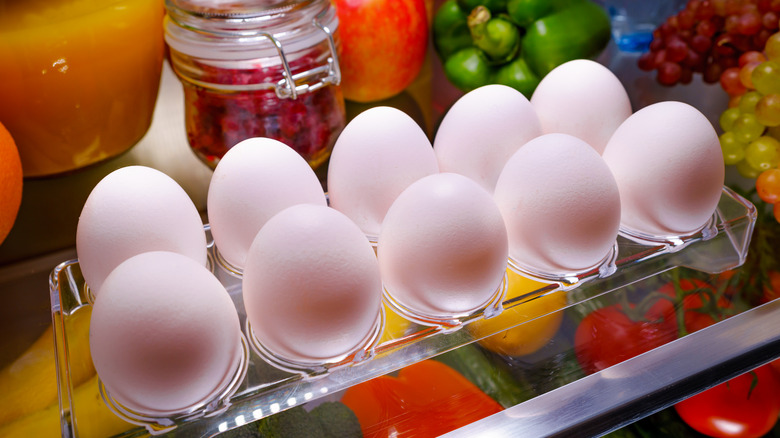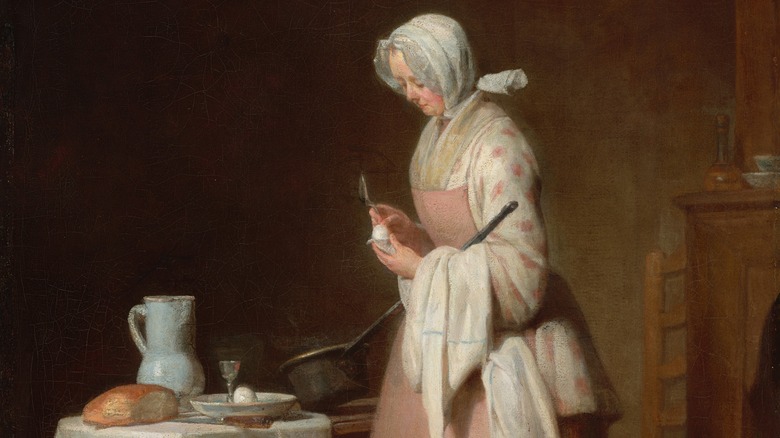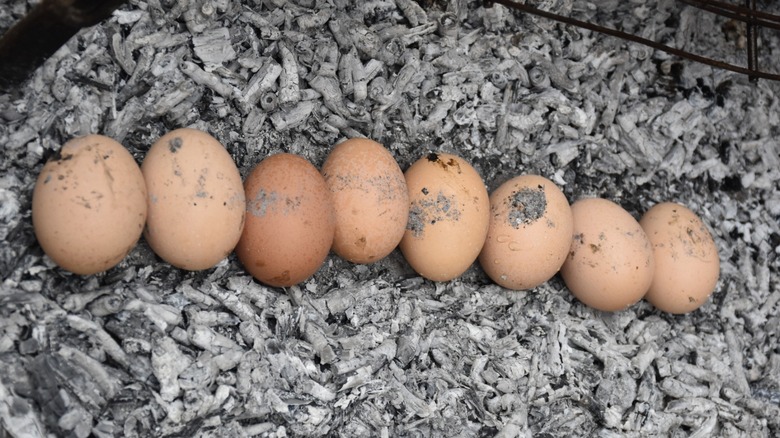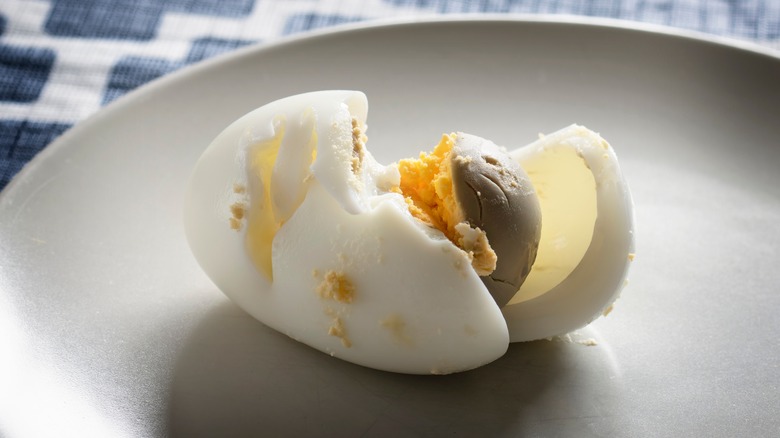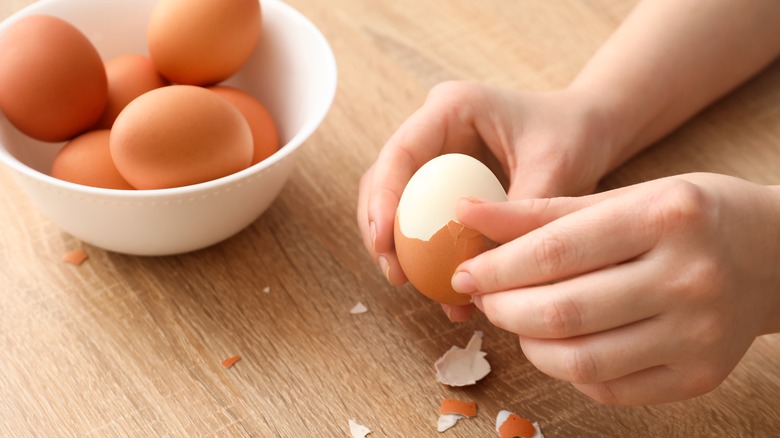11 Facts You Should Know About Hard-Boiled Eggs
There's arguably no food more versatile than the egg. It can be cooked in so many ways that the 100 folds in a chef's hat are said to symbolize the 100 ways you can cook an egg, though there are at least 101 ways by our count. Perhaps the most versatile preparation is the hard-boiled egg. Unlike soft-boiled eggs, which are only partially cooked resulting in a runny yolk, hard-boiled eggs are cooked all the way through. Delicious on their own, hard-boiled eggs are also the star of (or at minimum the best supporting actor for) dishes like deviled eggs, Cobb salad, and egg salad sandwiches.
While you may already know the difference between a hard-boiled egg and a soft-boiled egg, as well as how to cook the perfect hard-boiled egg with a creamy yet fully set yolk, there's plenty you likely don't know about this superfood. From their humble beginnings and nutritional profile to all the tricks for peeling them, here are 11 facts you should know about hard-boiled eggs.
1. Americans love hard-boiled eggs
In 2022, the food blog Pantry & Larder compiled Google Trends results from all over the United States to determine the most popular egg-cooking preparation in America and, perhaps surprisingly, the boiled egg came out on top. To get the data, P&L looked at the most-searched egg styles from state to state and compared that with the national average. In 17 states, the most searched egg style was the boiled egg (the next closest was the poached egg, with 10 states searching it more than any other style).
To break things down even further, the blog looked at the trends differentiating between hard-boiled and soft-boiled eggs in all 50 states and found that the hard-boiled egg was the clear favorite with 30 states preferring it (based on search frequency). There are certainly some limitations to this analysis since we can't get into the minds of Americans during their Google searches (and it's possible that everyone already knows how to make the best scrambled eggs or fried eggs). Still, that many searches for hard-boiled eggs certainly means a lot of Americans are making and consuming them for more than just Easter and Thanksgiving.
2. Hard-boiled eggs are a quick source of protein
Protein is an essential nutrient not only for your muscles (just ask any bodybuilder), but also for building healthy bones, cartilage, and even skin. While many of us may eat some form of meat as our biggest source of protein, hard-boiled eggs are also a great source of the important nutrient and are much more portable than some other sources like meat and fish. One large egg contains 6.3 grams of protein and is considered a complete protein because it contains all nine of the essential amino acids humans are unable to make in their own bodies (we can make the other 11). While there are other portable sources of protein like nuts, seeds, and even vegetables and whole grains, those sources of protein don't contain all nine of the essential amino acids and are therefore considered incomplete proteins.
For a quick source of protein before or after a workout, or for a protein-rich breakfast on your way out the door for your morning commute, a simple boiled is a great option. For more substance and the perfect Millennial nosh, add a sliced hard-boiled egg to the top of your avocado toast.
3. They're also good for your heart – really!
When you think of hard-boiled eggs with their bright yellow or orange yolks, there's a chance you also instinctively think about cholesterol as well. It's true that eggs contain cholesterol (around 186 mg in a typical large egg) and that cholesterol — particularly "bad" LDL cholesterol — can clog your arteries and lead to heart disease or even a stroke, but it turns out that the cholesterol in eggs doesn't raise our cholesterol the way scientists and doctors once feared. Researchers in a 2018 study found that adults who ate eggs every day were actually less likely to have heart disease or a stroke than people who didn't. Because their findings were so significant, the researchers wanted to understand what was going on so they completed another study to figure it out.
In the follow-up study, published in 2022, they found that people who regularly ate eggs had more beneficial proteins in their blood, including some that helped increase HDL — or "good" — cholesterol, as well as fewer of the markers that are associated with heart disease. Speaking about their results, study author Canqing Yu told eLife, "Together, our results provide a potential explanation for how eating a moderate amount of eggs can help protect against heart disease."
4. Boiled eggs may even have less cholesterol than other eggs
You would think that the nutritional profile of an ingredient like eggs would be the same no matter what way they're cooked, but you'd be wrong. Sure, it's obvious that if you're cooking an egg in oil or butter the fat will change the egg's nutrition, but it turns out that's not the only thing contributing to the differences. Even if you fry an egg in a nonstick pan without any added fat, it will be nutritionally different than a boiled egg.
While we now know that not all cholesterol in eggs is bad, and can actually be protective, the temperature at which eggs are cooked can further impact how the cholesterol in them is oxidized and absorbed in the body. According to a 2003 study in the journal Biological Research, the high-temperature cooking of eggs in preparations like frying leads to more cholesterol oxidization (which leads to more LDL or "bad" cholesterol) than relatively lower-temperature cooking like boiling. So while eating eggs regularly is good for your heart, it may be the case that eating hard-boiled eggs regularly is even better.
5. There are tons of hacks for how to peel hard-boiled eggs
While hard-boiled eggs are a super convenient source of protein that can be eaten on the go or added to just about any meal, they're not always easy to peel. From sharp eggshell pieces getting lodged under your fingernail (ouch!) and the slippery membrane being hard to remove to large chunks of egg white sticking to the pieces of shell you peel off, the whole process can easily go sideways. Luckily, it seems that just about everyone has a hack for how to easily peel a hard-boiled egg.
From cracking and peeling them underwater or shaking them all together in a container, to using a spoon, tape, or any number of egg-peeling gadgets, there's no shortage of tactics for getting a perfectly smooth hard-boiled egg without all the hassles that come with peeling them. No matter the method, however, virtually none is foolproof. That's right, we said it. No matter how you choose to peel your hard-boiled eggs, sometimes the egg is just going to be hard to peel.
6. How hard they are to peel may be an indicator of freshness
Why, with all our advances in cooking and science (and the science of cooking) can't we get a perfectly peeled hard-boiled egg every time? The answer may be in the freshness of your eggs and it is related to that annoying, sticky membrane that is sometimes a real pain to remove from your hard-boiled egg.
While most foods are at their best when they're at their freshest, fresh eggs are notoriously harder to peel. According to Margaret Hudson, the president and CEO of Burnbrae Farms, fresh egg whites are much more likely to stick to the membrane on the inner shell of the egg when they're boiled because fresher egg whites are more acidic. As the egg ages, however, the acidity decreases and the space between the egg white and that sticky membrane increases, making it less likely your boiled egg will stick to the shell.
For the easiest peeling experience, let your farm-fresh eggs sit in the refrigerator for a week or two before you boil them.
7. Their shelf-life may not be as long as you think
If you've ever noticed a bag of hard-boiled eggs in the refrigerated section of the grocery store, you may have assumed it's an indication hard-boiled eggs last a pretty long time. After all, how fast can those things really sell?
There is a lot of confusion surrounding expiration dates and what they really mean, but according to the United States Department of Agriculture (USDA), raw eggs from the grocery store are typically safe to eat for three to five weeks from the time you bring them home if they're properly refrigerated (even if their printed expiration date passes during this period). Interestingly, the freshness period for raw eggs might be even longer for eggs you buy at a farm stand or that you get from chickens you've raised yourself. While commercially available eggs are always washed due to federal regulations, unwashed eggs actually stay fresh longer (for weeks, even without refrigeration!), according to the Livestock Project at Iowa State University.
Regardless of how you store your fresh eggs, however, according to the USDA, hard-boiled eggs expire much more quickly than their fresh counterparts and are only safe to eat for about a week in the refrigerator.
8. The tradition of eating hard-boiled eggs goes back centuries
Given the long history of domesticated poultry, it's probably unsurprising that people have been eating eggs for a very long time, but you may be surprised to learn that hard-boiled eggs in particular date back centuries. According to Dr. Karen Carr, Associate Professor Emerita in the Department of History at Portland State University, the invention of pottery at around 5000 BC is what led to the very first hard-boiled eggs.
From that point forward, hard-boiled eggs were a staple in a multitude of cultures and cuisines in eras ranging from Ancient Rome and Egypt to Medieval Europe and the Italian Renaissance. The applications were numerous, just as they are today: served as a garnish for salads, on their own and dressed with sauces, or chopped and mixed with other ingredients were all popular ways to eat hard-boiled eggs throughout these multitude regions. Louis XV was even said to eat boiled eggs every Sunday. If they're good enough for Louis the Beloved, they're good enough for us!
9. Before hard-boiled eggs, there was another way people cooked their eggs in the shell
While hard-boiled eggs were necessarily preceded by the invention of pottery so that there was a vessel in which to boil them, it was not the first way eggs were cooked in their shells. Ash-roasted eggs go back much further than hard-boiled eggs because all that was needed to cook them was the hot coals from a fire. Though the exact timeline of how long they've been eaten is unclear (Dr. Karen Carr says they go back a million years while "Top Chef Canada judge Chris Nuttall-Smith told the Good Food podcast that he thinks their origin is Ancient Rome), it's clear that eggs cooked in their shell have a long and storied history and making them is incredibly easy.
To make ash-roasted eggs, Nuttall-Smith explained on the podcast, "You take an egg, you poke a little hole in the top to let expanding air come out so your eggs don't explode, and you just stick them in warm ashes from your fire. You stick them in about two-thirds of the way. It usually takes about six to 10 minutes and you get such a gorgeous, soft or hard-boiled egg, however you like it."
10. A green yolk is safe to eat
Just because making hard-boiled eggs is relatively easy, that doesn't mean that they always come out perfectly as planned. Most conventional wisdom dictates that to make perfect hard-boiled eggs you just need to cover your eggs with cold water and a little salt, bring them to a rolling boil, and then remove them from the heat and let them sit, covered, for around 15 minutes. That said, not everyone agrees on either the strategy or the exact timing for a perfect hard-boiled egg.
The problem with a cooking method that not everyone agrees on is that while it seems straightforward, it's also very easy to overcook a hard-boiled egg. When this happens, the normally yellow or orange yolk of your hard-boiled egg can come out with a strange, offputting green tinge. According to the USDA, it's the product of a chemical reaction of iron and sulfur when a hard-boiled egg is cooked for too long. While this is not exactly appetizing, it's perfectly safe.
11. The color of their shell doesn't impact their nutrition
Though hard-boiled eggs can have shells that are white, brown, or even a light shade of green or blue, this is really just a product of the breed of hen that laid the egg. Despite this fact, and research that has shown that there's no nutritional difference between the different colored eggshells, somewhere along the way people got the idea that brown eggs are healthier than white eggs (and that the exotic-looking green and blue eggs are even healthier). The origin of this myth can most likely be attributed to two factors: brown eggs cost more than white egg,s and healthy food tends to be more expensive than less healthy food.
This is a classic case of a logical fallacy called the fallacy of the undistributed middle where people assume that just because two things are true for a specific reason a third, related thing must also be true for the same reason. In fact, brown eggs are more expensive for a relatively simple reason: the breeds that lay them are bigger so they require more feed and therefore their eggs cost more. The more you know.
